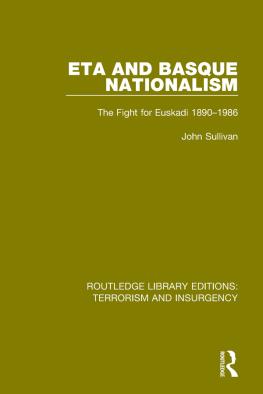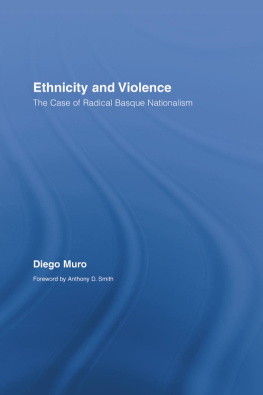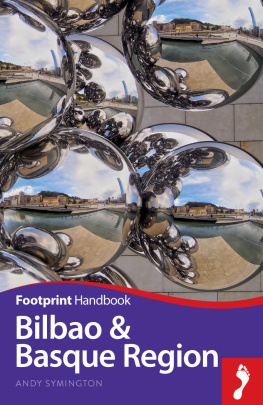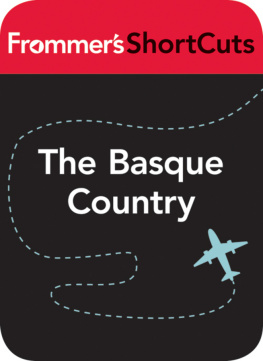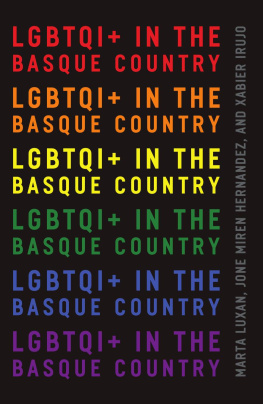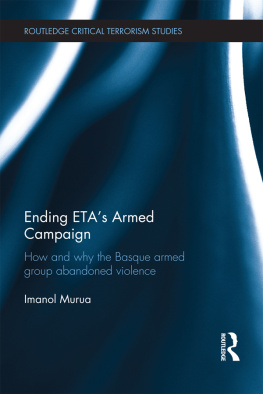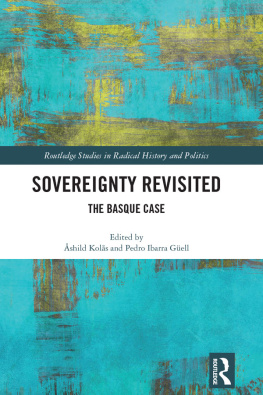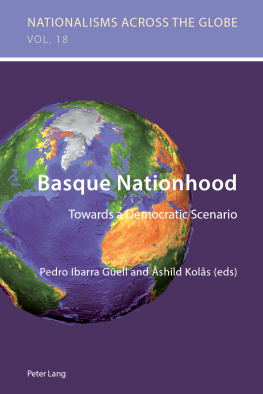ROUTLEDGE LIBRARY EDITIONS: TERRORISM AND INSURGENCY
Volume 8
ETA AND BASQUE NATIONALISM
ETA AND BASQUE NATIONALISM
The Fight for Euskadi
18901986
JOHN SULLIVAN
First published in 1988
This edition first published in 2015
by Routledge
2 Park Square, Milton Park, Abingdon, Oxon, OX14 4RN
and by Routledge
711 Third Avenue, New York, NY 10017
Routledge is an imprint of the Taylor & Francis Group, an informa business
1988 J.L. Sullivan
All rights reserved. No part of this book may be reprinted or reproduced or utilised in any form or by any electronic, mechanical, or other means, now known or hereafter invented, including photocopying and recording, or in any information storage or retrieval system, without permission in writing from the publishers.
Trademark notice: Product or corporate names may be trademarks or registered trademarks, and are used only for identification and explanation without intent to infringe.
British Library Cataloguing in Publication Data
A catalogue record for this book is available from the British Library
ISBN: 978-1-138-83955-7 (Set)
eISBN: 978-1-315-69683-6 (Set)
ISBN: 978-1-138-90028-8 (Volume 8)
eISBN: 978-1-315-70735-8 (Volume 8)
Publishers Note
The publisher has gone to great lengths to ensure the quality of this reprint but points out that some imperfections in the original copies may be apparent.
Disclaimer
The publisher has made every effort to trace copyright holders and would welcome correspondence from those they have been unable to trace.
ETA and BASQUE NATIONALISM
The Fight for Euskadi 18901986
John Sullivan
ROUTLEDGE
London and New York
First published in 1988 by
Routledge
11 New Fetter Lane, London EC4P 4EE
Published in the USA by
Routledge
in association with Routledge, Chapman & Hall, Inc.
29 West 35th Street, New York NY 10001
1988 J.L. Sullivan
Filmset by Mayhew Typesetting, Bristol, England Printed and bound in Great Britain by Biddies Ltd, Guildford and Kings Lynn
All rights reserved. No part of this book may be reprinted or reproduced or utilised in any form or by any electronic, mechanical, or other means, now known or hereafter invented, including photocopying and recording, or in any information storage or retrieval system, without permission in writing from the publishers.
British Library Cataloguing in Publication Data
Sullivan, J.L.
ETA and Basque nationalism: the fight
for Euskadi 18901986.
1. Euskadi ta Askatasuna History
I. Title
322.4209466 DP302.B48
ISBN 0-415-00366-0
Library of Congress Cataloging in Publication Data
ISBN 0-415-00366-0
Contents
For Palmira
This book is based on a thesis for which I was awarded the degree of Ph.D (London) in 1986. My thanks are due to the many people who helped me by allowing themselves to be interviewed, by obtaining documents and by assisting in other ways. I am particularly grateful to Antoln Amescua, Feliz Aizpurua, Mara Teresa Castells, Toms Goikoetxea, Eufemia Gonzlez, John Hollyman, Bianca Imizcoz, Alison Lever, Antonio G. Perics, Octavio Rico and Ramn Zulaica.
My greatest debt is to my supervisor Professor Paul Preston, without whose guidance and criticism the work would never have been completed.
I am grateful to my employers, the Western District of the Workers Educational Association for granting me time off for research and writing during Spring 1980 and Summer 1984.
I am grateful to the trustees of the Isobel Thornley Bequest, University of London, for the financial assistance with the publication of this book.
Basque nationalism originated in the 1890s in Vizcaya as a response to the rapid transformation of Basque society by the industrialisation which brought massive immigration of workers from other parts of Spain. The immigrants, who came to seek work in the iron mines and steel works, transformed many areas which had once spoken the Basque language, Euskera, into Spanish-speaking districts. In their struggle against savage exploitation and harsh working conditions they formed branches of the Unin General de Trabajodores (UGT) and of the Partido Socialista Obrero Espaol (PSOE).1 Both the UGT and the PSOE were militantly anticlerical, and were seen as dangerous and immoral by many devout Basque Catholics. The immigrants, apart from their trade union and political activities, merely by speaking Spanish seemed to threaten the stability of traditional Basque society. In addition, many Basques saw the immigrants as morally licentious and consequently as a danger to the ethnically Basque population.2 Indeed, later nationalist theoreticians argued that Spaniards were racially inferior to Basques.
Until the 1890s the social distinctiveness of the four Basque provinces had produced no nationalist consciousness. The founder of Basque nationalism, Sabino Arana, the son of a Carlist shipbuilder, had to invent a name, Euskadi, for the Basque country, design a flag for it, and construct an ideology which would justify the regions claim to independence from Spain. Arana was able to draw on a potent myth which was to be tremendously effective in building a nationalist movement, first in Vizcaya, and later in the other three Basque provinces. The most distinctive feature of Basque society was the language (or group of languages), Euskera, which is not Indo-European and has no apparent connection with any other tongue. This fact was enormously helpful in emphasising the distinctiveness of the Basques and justifying their right to be independent of Spain and France. The singularity of Enskera encouraged the belief that the Basques were a race apart.3 Naive versions of Basque history suggested that Enskera might be the language of the Garden of Eden, and the tongue spoken by all mankind before the disaster of the tower of Babel. The Basques were thought to be the descendants of Tubal, son of Japhet and grandson of Noah. It was claimed that they had lived in an egalitarian, democratic society, where the laws were made by assemblies of all the citizens, while the rest of the world lived under tyranny. According to this account, the Basques had fought for centuries to preserve their independence from foreign conquerors. In 778, for example, they had defeated the army of Charlemagne at Roncesvalles. The ancient laws, the Fueros, which were held to be unique to the Basque country, had, it was claimed, provided a purer democracy than anything existing elsewhere in the world before modern times.4 The Basque country, as it had not, like most of Spain, been subjected to Roman or Moorish occupation, had escaped the corrupting effect of living under tyranny, and the contamination resulting from mingling with those of Moorish or Jewish race.5.
The Basques had, it was claimed, freely negotiated agreements which accepted the Spanish King as the lord of Vizcaya and of other Basque provinces. However, such treaties were not to be understood as subjection since the King had to rule according to the ancient laws embodied in the Fueros. The racial superiority of the Basques had been recognised, it was claimed, by a royal decree granting the citizens of Vizcaya universal nobility. The devout Catholicism of the Basques, shown by the life of such saints as Ignatius Loyola and Francis Xavier, was also produced as evidence of their moral superiority over Spaniards. The idyllic harmony of traditional Basque society was allegedly broken by the anticlerical and centralising policies adopted by Spanish governments in the nineteenth century. The Basques had seized the opportunity provided by a dynastic quarrel in 1833 to ally with Don Carlos, the conservative claimant to the Spanish throne, supported by the most reactionary forces, in order to preserve their

